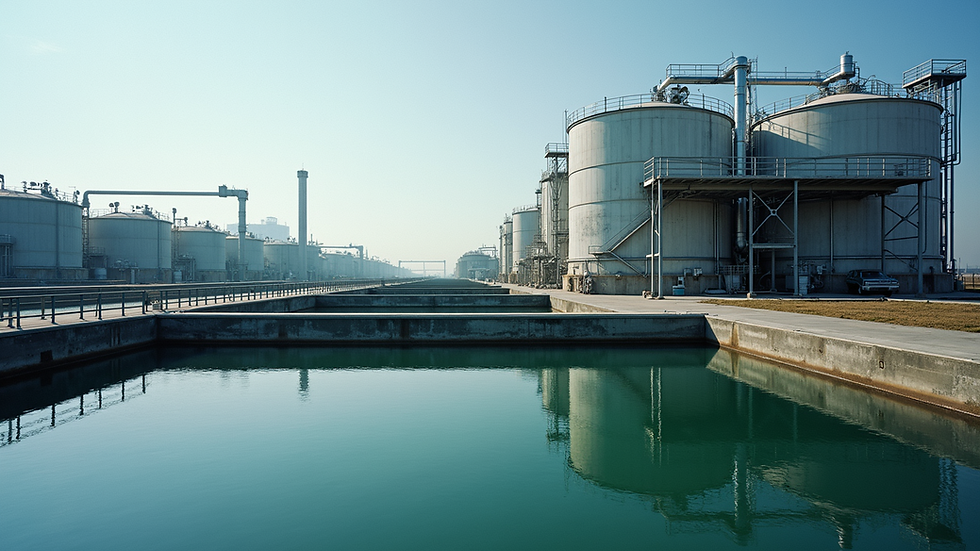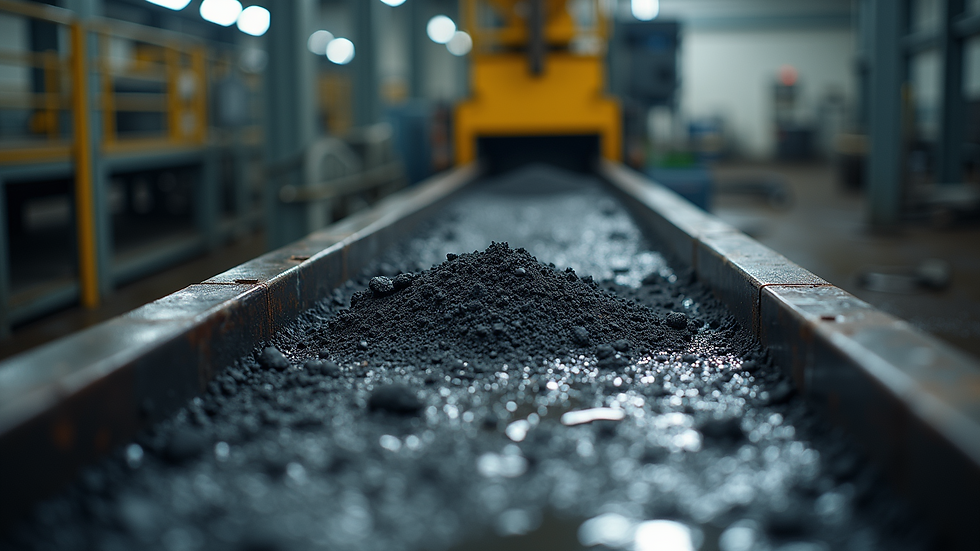Understanding Challenges in Industrial Wastewater Treatment
- karan9377
- Sep 14, 2025
- 4 min read
Industrial effluent management is a critical aspect of environmental protection and sustainable industrial growth. Industries generate large volumes of wastewater containing various pollutants that can harm ecosystems and human health if not treated properly. Managing this wastewater effectively requires understanding the challenges involved and implementing practical solutions. This article explores the key difficulties faced in industrial effluent management and offers actionable recommendations to overcome them.
Key Challenges in Industrial Effluent Management
Managing industrial effluent involves dealing with complex wastewater streams that vary widely depending on the industry type and processes used. Some of the main challenges include:
Complex Composition: Industrial effluent often contains a mix of organic and inorganic pollutants, heavy metals, toxic chemicals, and suspended solids. This complexity makes treatment difficult because a single method rarely addresses all contaminants effectively.
High Variability: The volume and composition of effluent can fluctuate significantly due to changes in production schedules, raw materials, and operational conditions. This variability complicates the design and operation of treatment systems.
Regulatory Compliance: Industries must comply with strict environmental regulations that set limits on pollutant discharge. Meeting these standards requires continuous monitoring and advanced treatment technologies, which can be costly.
Cost Constraints: Installing and maintaining efficient treatment plants demands significant capital and operational expenditure. Many industries struggle to balance environmental responsibility with economic viability.
Sludge Management: Treatment processes generate sludge that requires safe disposal or reuse. Handling sludge adds another layer of complexity and cost to effluent management.
To address these challenges, industries need to adopt integrated approaches combining technology, process optimization, and regulatory adherence.

Strategies for Effective Industrial Effluent Management
Successful industrial effluent management depends on a combination of technical, operational, and managerial strategies. Here are some practical recommendations:
Source Reduction and Process Optimization
Minimizing pollutant generation at the source is the most cost-effective approach. This can be achieved by optimizing manufacturing processes, using cleaner raw materials, and recycling water within the plant.
Advanced Treatment Technologies
Employing a combination of physical, chemical, and biological treatment methods can improve pollutant removal efficiency. Technologies such as membrane filtration, activated carbon adsorption, and advanced oxidation processes are increasingly used.
Real-Time Monitoring and Automation
Installing sensors and automated control systems helps track effluent quality continuously. This enables timely adjustments to treatment processes and ensures compliance with discharge standards.
Employee Training and Awareness
Educating staff about the importance of effluent management and best practices promotes responsible behavior and operational excellence.
Collaboration with Experts
Partnering with environmental consultants and technology providers can help industries stay updated on regulatory changes and adopt innovative solutions.
By implementing these strategies, industries can reduce environmental impact while maintaining operational efficiency.
What are three types of industrial waste?
Industrial waste can be broadly categorized into three main types, each posing unique treatment challenges:
1. Hazardous Waste
This includes toxic chemicals, heavy metals, solvents, and other substances that pose significant risks to health and the environment. Hazardous waste requires specialized treatment and disposal methods to prevent contamination.
2. Non-Hazardous Waste
Non-hazardous waste consists of materials like packaging, scrap metals, and organic residues that are less dangerous but still need proper management to avoid pollution.
3. Sludge Waste
Generated from wastewater treatment processes, sludge contains concentrated pollutants and requires careful handling. It can sometimes be treated further for beneficial reuse, such as in agriculture or energy production.
Understanding these waste types helps in designing targeted treatment and disposal strategies that comply with environmental regulations.

The Role of Technology in Overcoming Treatment Challenges
Technological advancements play a vital role in addressing the complexities of industrial effluent management. Some notable innovations include:
Membrane Bioreactors (MBR): Combining biological treatment with membrane filtration, MBR systems offer high-quality effluent suitable for reuse.
Electrocoagulation: This process uses electrical currents to remove suspended solids and heavy metals efficiently.
Advanced Oxidation Processes (AOPs): Techniques like ozone and UV treatment break down persistent organic pollutants that are difficult to degrade biologically.
Zero Liquid Discharge (ZLD): ZLD systems aim to eliminate liquid waste by recovering and recycling all water, leaving behind solid residues for disposal.
Adopting these technologies requires careful evaluation of cost, scalability, and compatibility with existing infrastructure.
Practical Steps for Industries to Improve Effluent Management
Industries looking to enhance their effluent management can follow these actionable steps:
Conduct Comprehensive Wastewater Audits
Analyze the composition and volume of effluent regularly to identify pollution sources and treatment needs.
Invest in Modular Treatment Units
Modular systems allow flexibility to adapt to changing effluent characteristics and production scales.
Implement Water Recycling Programs
Reusing treated water reduces freshwater consumption and lowers discharge volumes.
Engage with Regulatory Authorities
Maintain open communication with environmental agencies to stay informed about compliance requirements and available support.
Promote Sustainability Culture
Encourage innovation and responsibility among employees to foster continuous improvement in environmental performance.
By taking these steps, industries can achieve sustainable effluent management that benefits both business and the environment.

Moving Forward with Sustainable Industrial Effluent Management
Addressing the challenges in industrial effluent management is essential for protecting natural resources and public health. Industries must embrace a holistic approach that integrates technology, process improvements, and regulatory compliance. Continuous innovation and commitment to sustainability will enable industries to reduce their environmental footprint while maintaining productivity and profitability.
For more detailed information on managing industrial wastewater, exploring advanced treatment solutions, and regulatory guidance, consulting specialized resources and experts is highly recommended. Sustainable effluent management is not just a regulatory obligation but a strategic advantage in today’s environmentally conscious market.



Comments